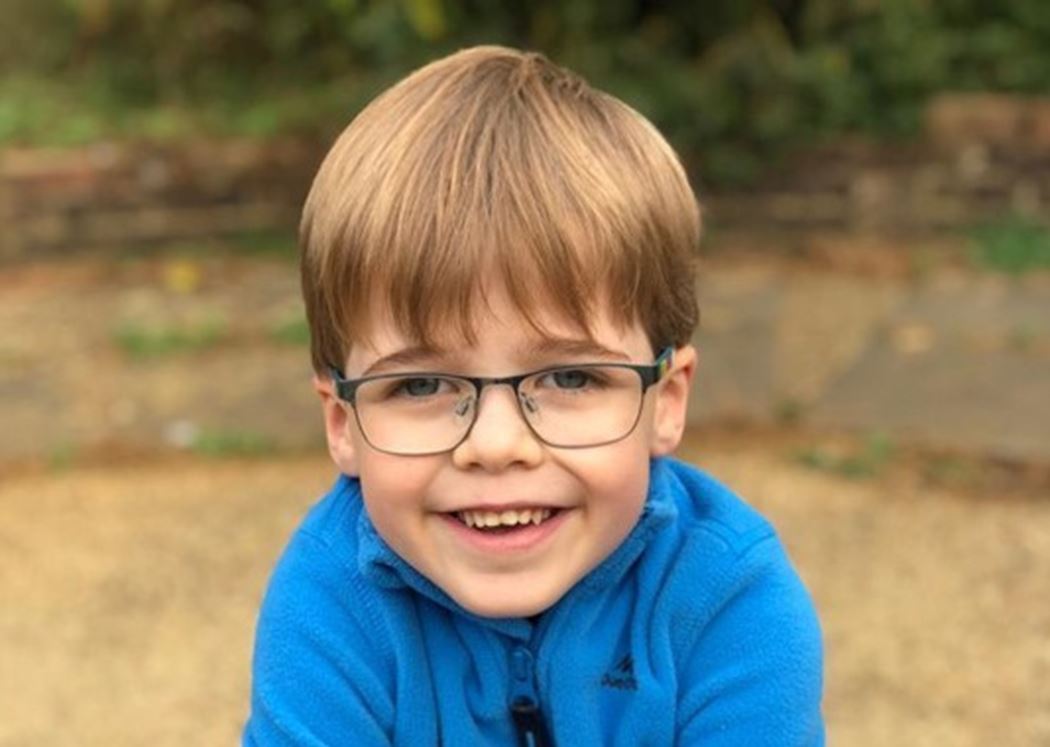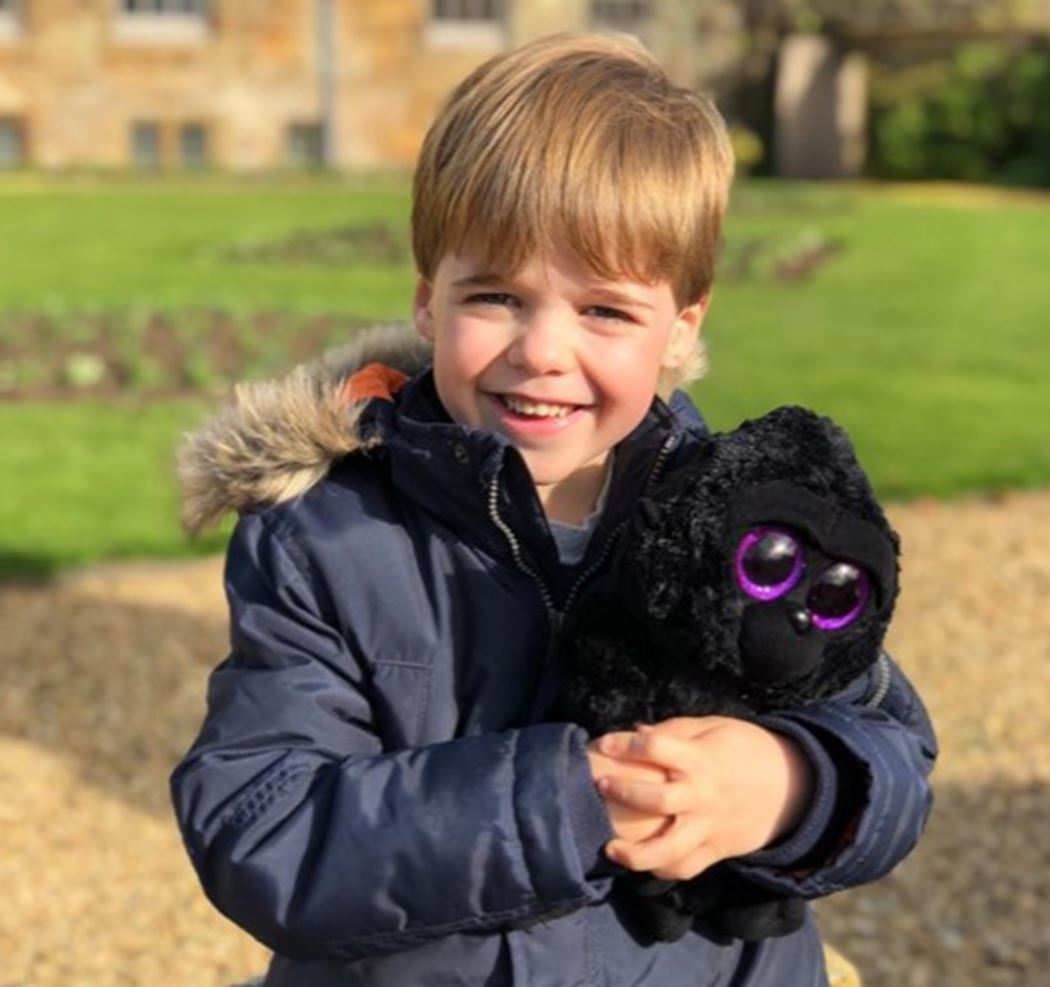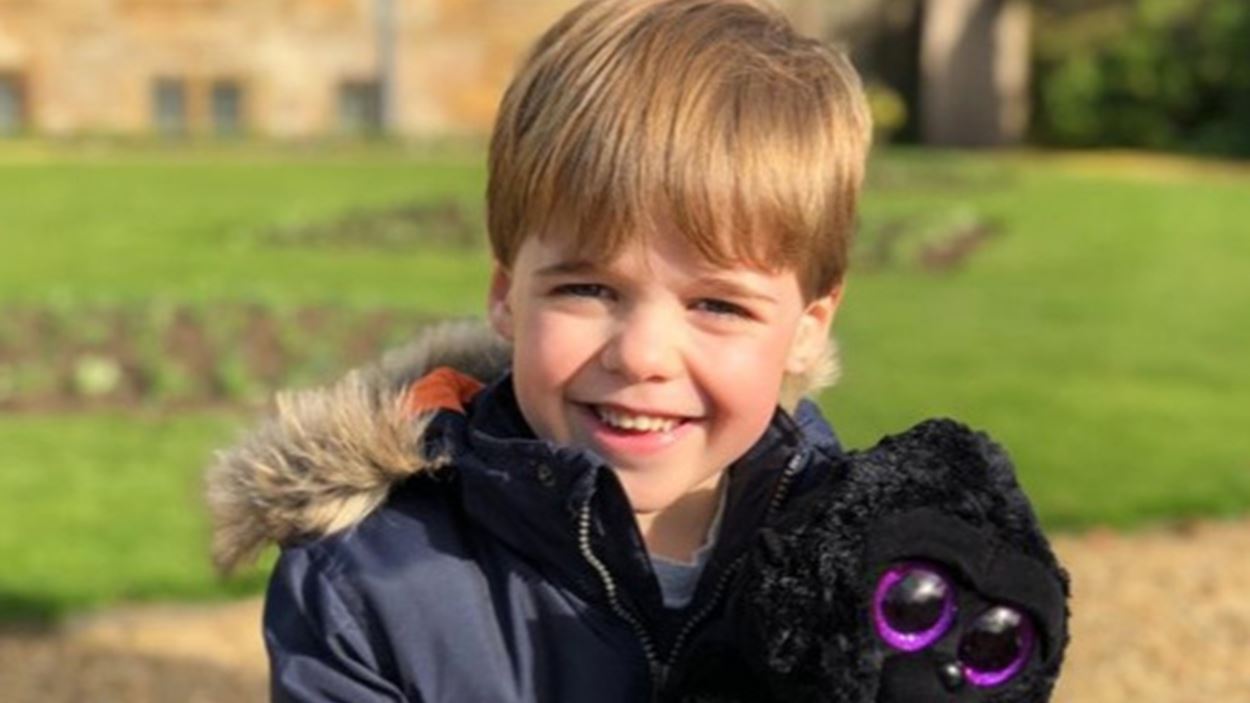Finn's mum Sarah spoke at our family day in Oxford in 2018 about her family's experience of having a child, Finn, with Very Early Onset IBD.
I live in Northamptonshire with my husband, Drew, and our two children, Elsie, eight, and Finn, six. Finn was diagnosed with IBD two years ago when he had just turned four. It was a long road to diagnosis, but Finn’s symptoms started as a baby. We saw some lovely paediatricians, but his symptoms were not attributed to IBD for a long time and became conflated with a cow’s milk protein intolerance he had as a baby. Prior to Finn’s diagnosis, we had very little awareness or understanding of inflammatory bowel disease (IBD). Drew and I are both primary school teachers but, even so, we had not come across IBD in children before.
There is no IBD in either of our families, so this was a strange, unexpected and scary place to find ourselves in.
Every person’s IBD seems so unique, but I am sure many other parents will be able to relate to some of our experiences.
Finn was born in 2012. His older sister, Elsie, had been born two years earlier. First time around, we had been blessed with a baby who started to sleep through the night from around six weeks; we all enjoyed 12-hour snooze-filled nights, as well as regular, long, daytime naps. We only truly realised how remarkable Elsie’s sleeping ability was when Finn arrived.
Oh my! Finn did not sleep. He cried.

He initially had trouble feeding thanks to a tongue-tie but, even when this was resolved, he found it very hard to settle and seemed in a lot of distress, a lot of the time. He would forcefully regurgitate feeds and was very difficult to console. Because he was so sick and empty after feeds, he was hungry and wanted to feed again almost straight away. His poo was very frequent and runny.
We were in a continuous feed-sick-feed-poo cycle, with very little rest on anyone’s part. It was, in short, exhausting.
Many, many trips to GPs followed and we were sent away with, ‘it’s just a bit of colic’, which then became, ‘just a bit of reflux’. I floated the idea of allergies/intolerance as at the time my baby niece had been found to be dairy intolerant, but this idea was dismissed. It was only when a health visitor came to our house and saw first-hand the typical violent and alarming projectile vomit in action that she raised concerns with our doctor about the difficulties we were facing. Finn was never underweight, so he always appeared to others to be thriving. After six months of exclusive breastfeeding, we began introducing some solids.
A bowl of cereal with a dash of cow’s milk produced raised red bumps all over Finn’s face within hours.
I visited another GP and she agreed that it would be wise for me and Finn to exclude all dairy from our diets for two weeks and observe the results. The results proved to be dramatic – the eczema that had covered Finn’s head disappeared within days and the vomiting stopped. He even started to settle and sleep (a bit!). Hallelujah! At last.
Finn was referred to a paediatrician at our local hospital (which was then Northampton). He advised excluding dairy with a slow, managed reintroduction later. Finn was discharged from the paediatrician at 12 months, as the vomiting had mostly resolved and he was growing and gaining weight. However, his bowel movements - slimy and frequent - continued to be concerning. The first time I noticed blood in Finn’s stool was at 18 months. His frequent, leaky nappies were mucousy and were now streaked with blood. Alarmed, I took him to another GP, who said it was, ‘just one of those things’. It turned out that it wasn’t a one-off. We had more nappies that were jelly-like and, again, streaked with blood. This continued and, confusingly, seemed to have little correlation to foods eaten. Over the course of several more GP visits, I pressed to go back to the paediatrician, who had told us to ask to go back if we had any concerns.
We were referred again, in the end, and continued to see the paediatrician at Northampton for over a year but eventually, rather puzzled, he asked his colleagues at Leicester Royal for a second opinion – to perhaps rule out intestinal polyps or similar. Finn was under the paediatric gastro team at Leicester for another year before his symptoms worsened. In September 2016, I had a phone call at work from his preschool to tell me that Finn had been to the toilet eight times within an hour. He was experiencing frequent diarrhoea and passing blood. At our next appointment, it was decided that investigation was needed.
Finn underwent a colonoscopy and endoscopy in November 2016, just after turning four years old.
Well - the consultant said – we didn’t find any polyps…. But I did see that his entire colon is ulcerated and bled when I touched it with the scope. Have you heard of ulcerative colitis? I didn’t know much at all about ulcerative colitis other than it’s for life; forever.

The doctors hadn’t suspected IBD and we were totally unprepared for this.
I didn’t feel any relief at knowing what was wrong – I was stunned that there was indeed something so wrong. At this point I have to stop and apologise – I do realise I am retelling the whole of Finn’s life story so far! However, it is impossible to pinpoint exactly when his symptoms started. He always seemed to have a lot going on. I suspect he developed IBD in his first year. I was sent away from many GPs and made to feel like a neurotic mother, making a fuss.
After his diagnosis, I wondered whether I should have shouted louder and made more of a fuss!
A week after his scopes, a Crohn’s & Colitis UK information pack arrived in the post, sent courtesy of the hospital but, other than that, we really felt lost and alone.
We had been sent home with a diagnosis and a large bottle of Sulfasalazine, but that was it. Sadly, our hospital had no IBD nurse at that time. Another week or so on, Finn’s consultant rang; biopsy results confirmed a diagnosis of inflammatory bowel disease but not UC, rather unclassified (IBDU).
Just a couple of months after diagnosis, Finn had a bad flare. Over the Christmas and New Year period the symptoms recurred with a vengeance. Finn had a six-week course of steroids and was put onto Azathioprine as these tapered off.
The hangry steroid weeks were not fun. I do remember standing in my dressing gown, crushing the Prednisolone tablets every morning to mix with a little squash (these medications are not designed to be taken by children), feeling utterly bewildered by what our life had become. The amount of medicines I was administering to our little boy seemed astonishing.
The steroids did the trick though, and Finn’s energy returned and his symptoms settled.
Starting on Azathioprine at the same time as several outbreaks of chickenpox at preschool meant that, in the early weeks of 2017, we seemed to be at the hospital for blood tests every week. We have long had a deal with Finn that, after a blood test, he can choose a magazine as a treat. This deal was made before his diagnosis – if only we had known the hundreds of pounds on Cbeebies magazines this would end up costing us!
His preschool staff were amazing and really supported us as a family through those difficult months following diagnosis as we adjusted to all the changes for Finn and for us as a family.
Finn starting school was a big step and one I was very apprehensive about.
His primary school is small, at just over 100 pupils, he has a big sister there and I even teach there part-time! Even so, I certainly felt extremely protective and anxious about the changes ahead. Armed with three sides of A4 paper I had written and a bundle of leaflets, we asked for a meeting with Finn’s headteacher, reception teacher and teaching assistant in the summer term before he started school. I feel this was really important to properly explain his condition, medicines, diet and special considerations (such as the importance of sunscreen for example, and of course - access to a toilet).
Two years on from diagnosis, our new normal is one of blood tests, hospital visits, medicines and dietary vigilance.
Nothing is spontaneous! That big bottle of Sulfasalazine comes everywhere with us and, although I know we should try not to let his condition prevent us from doing all the things we otherwise would, there is always a small voice in my head worried about the effects of the Azathioprine and his risk of infection, which can limit where we go and what we do. IBD has happened to our whole family – there are so many ways we have been affected. Elsie is still so young too and has found it hard to understand all the time and attention Finn gets.
His latest scopes were on the day of his first school sports day, which of course was disappointing for Finn, but also meant that Mum and Dad weren’t there to watch Elsie in her races. Whereas I had once anticipated a fuller return to work, my work is now very part-time and fits around making sure Finn’s days are not longer than the school day, as he gets so tired, and so that I can take him to his many hospital appointments. I think it is fair to say that, as parents, Drew and I both feel somewhat detached from other parents and families at times and the worry can be overwhelming and all-consuming.
Finn’s latest scopes still show some ulceration to the colon and his diagnosis remains that of IBDU.
In addition, Finn was found to have an allergic disorder of the oesophagus – eosinophilic oesophagitis – which means another daily medicine, more dietary tweaks and further tests to come.
There have been scary times – like Finn being admitted to hospital to be checked for sepsis when he had an infection a year ago – and there have been calmer times when we have felt optimistic and more accepting of Finn’s IBD.
There is a sadness to hearing a four-year-old child able to roll off the words ‘Sulfasalazine’ and ‘Azathioprine’ with such ease.
There is never a good time to be diagnosed with IBD. I know there are many changes and challenges to come. Starting primary school was a major milestone and I’m sure moving on to secondary school will be even bigger. On the one hand, this is all Finn has ever known. On the other hand, as he grows and matures, he is starting, quite naturally, to feel the injustice and pain of being different and having this difficult condition to deal with.
He is, like all our amazing children, resilient beyond our expectations but, as parents, of course, we wish he didn’t have to be. We just want our boy to be the wonderful Finn he is and do all the things he loves to do – like being a Viking, brushing up on his spy techniques and fulfilling his ambition of being a rock star!
CICRA’s vision of a childhood unlimited by IBD is one we all long for as parents. Finn has IBD but it does not have him. He is so much more.
CICRA have been there for us at our most bereft – by giving us information, support and access to the brilliant information days.
We are so thankful to the field of specialists giving their time and dedication to improving the health and wellbeing of our children. We went to two information days last year and it was such a revelation and comfort to know that we are not alone. Thank you, CICRA, and I hope our story helps others to feel less alone.
help children like Finn by donating now
Your support means we can do more research to understand the causes of IBD, and we can provide information and support to more families with a child affected by inflammatory bowel disease like Crohn's, colitis, unclassified and very early onset IBD.
donate nowshare your story
Telling your story can be really helpful for others, and give useful insights to everyone about what living with inflammatory bowel disease (IBD) is really like for children and young people, and their families.
share your story